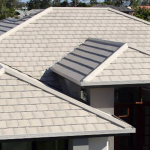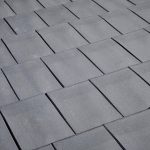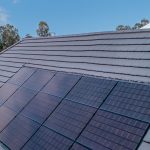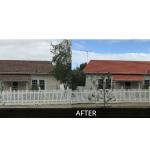
Water Pooling and Ponding on Flat Roof Tiles: Why Should it Be Fixed Immediately?
10 September 2020Water pooling and ponding should be a primary concern with any type of roofing, including tile since it can occur with any style of roof, home or building, especially during the colder months of the year, unless proper measures are taken. Moisture is the main cause of this issue, and it happens when the heated air inside the building rises into the attic or roof area. This is where the warm air comes into contact with the cooler exterior air to form the water pooling and ponding. When the roof is not designed correctly, the moisture has no escape route and can cause major issues. We provide further facts about the problem of water pooling and ponding, and why should it be fixed immediately.
Water Pooling and Ponding on Flat Roof Tiles Cause Damages
Excessive water pooling and ponding in your roof’s structure encourages mould growth. Mould can spread throughout the area rapidly since it prefers a moist environment to a dry one. When you do not address this issue fast enough, it can affect other parts of your home or building and the health of everyone who frequents it. Also, mould has been known to feed on the organic materials in homes and buildings.
In addition to mould growth, roof water pooling and ponding can cause the structural components of the roof to rot. Wood beams and other parts can start to decay while steel or metal parts can corrode and weaken. As a result, the integrity of your house’s or building’s framework will decrease drastically.
How To Prevent Roof Water Pooling And Ponding
The first way to prevent moisture from accumulating enough to cause water pooling and ponding is to hire a reputable, experienced roofing company to install your tile roofing. It will know the specific setup that your roof requires to prevent this issue.
Adequate roof ventilation is a must to allow the moisture a route to escape from your home and building. An experienced roofing crew knows how to add just the right amount of ventilation without going overboard. Excessive venting can cause heat loss, which increases your heating costs.
While insulating your house or building in a quality fashion can cut down on water pooling and ponding, go one step further and have the roofing crew install a vapour barrier. A vapour barrier is a waterproof membrane that moisture cannot penetrate.
As you can see, roof water pooling and ponding can be a major concern with of roofing materials, including tile roofing, since it is a structural and design issue more than it has to do with the nature of the roofing. For further facts about this topic, turn to Higgins Roofing. We specialise in roofing and in installing Monier™ roof tiles.
Recent Posts
-
 The Essential Autumn Roof Inspection Guide for Melbourne Homeowners in 2026
The Essential Autumn Roof Inspection Guide for Melbourne Homeowners in 2026 -
 2026 Roofing Trends: Colours & Tile Profiles Gaining Popularity in Melbourne Homes
2026 Roofing Trends: Colours & Tile Profiles Gaining Popularity in Melbourne Homes -
 How Tile Roofing Keeps Your Melbourne Home Cooler During Extreme Summer Heat
How Tile Roofing Keeps Your Melbourne Home Cooler During Extreme Summer Heat -
 Bushfire-Ready Monier Tiles: The 2026 Roofing Solution for High-Risk Areas
Bushfire-Ready Monier Tiles: The 2026 Roofing Solution for High-Risk Areas -
 Monier SOLARtile vs Bolt-On Panels: Integrated Solar Roofing for Melbourne Homes
Monier SOLARtile vs Bolt-On Panels: Integrated Solar Roofing for Melbourne Homes -
 Monier C-LOC™ Concrete Roof Tiles: Superior Gloss Retention, Durability & Long-Lasting Performance
Monier C-LOC™ Concrete Roof Tiles: Superior Gloss Retention, Durability & Long-Lasting Performance -
 Terracotta Tile Roof Restoration: 7 Signs Your Roof Needs Urgent Attention
Terracotta Tile Roof Restoration: 7 Signs Your Roof Needs Urgent Attention -
 Residential Roof Tile Installation: Preparing Your Home & Site for Installation Day
Residential Roof Tile Installation: Preparing Your Home & Site for Installation Day -
 Roof Extensions in Heritage Overlays: Matching Monier Profiles Without Breaching Planning Rules
Roof Extensions in Heritage Overlays: Matching Monier Profiles Without Breaching Planning Rules -
 Are Monier Concrete Roof Tiles the Most Economical Roofing Option? Here Are the Key Reasons
Are Monier Concrete Roof Tiles the Most Economical Roofing Option? Here Are the Key Reasons

